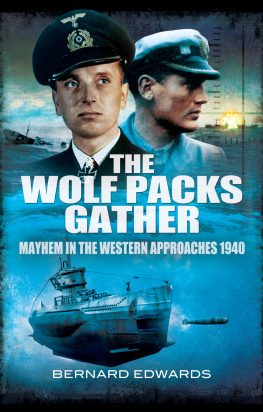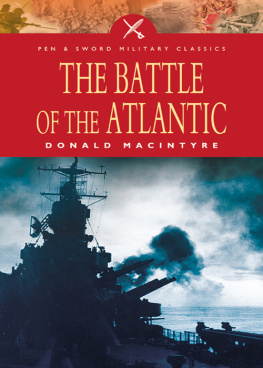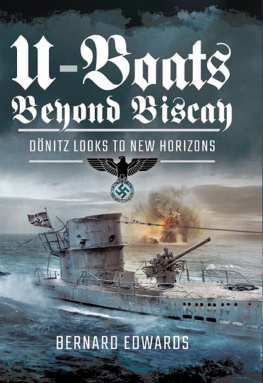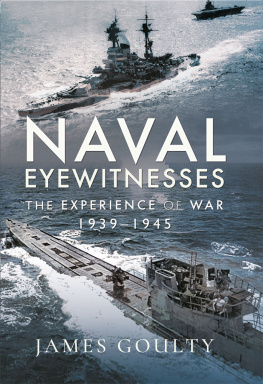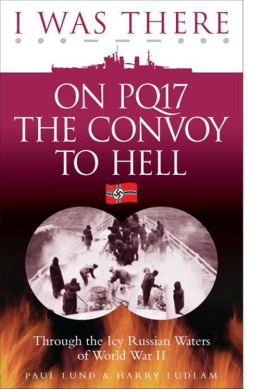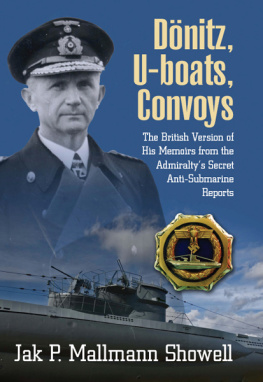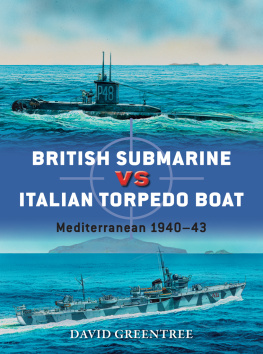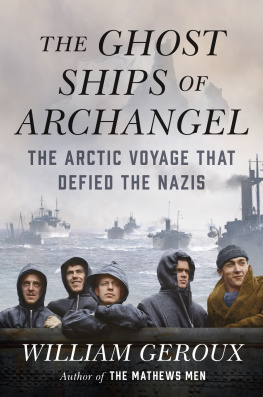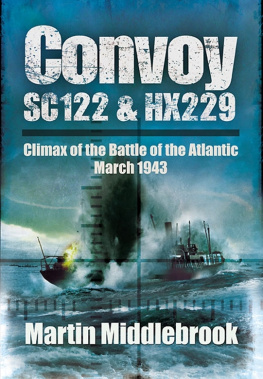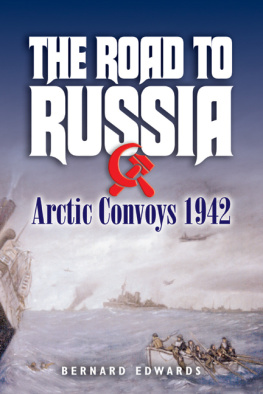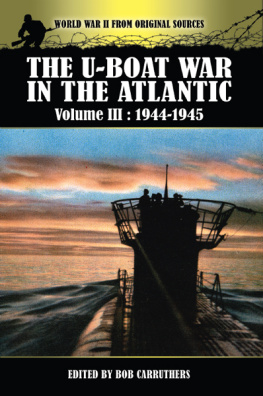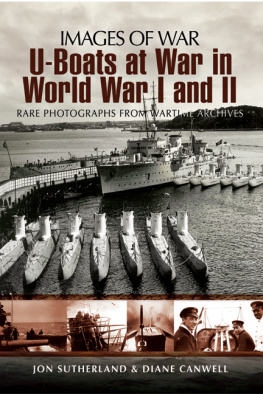
Other books by Bernard Edwards
Masters Next to God
They Sank the Red Dragon
The Fighting Tramps
The Grey Widow Maker
Blood and Bushido
SOS !Men Against the Sea
Salvo!
Attack and Sink *
Dnitz and the Wolf Packs
Return of the Coffin Ships
Beware Raiders! *
The Road to Russia *
The Quiet Heroes *
The Twilight of the U-Boats *
Beware the Grey Widow Maker
Death in the Doldrums *
Japans Blitzkrieg *
War of the U-Boats *
Royal Navy Versus the Slave Traders *
The Cruel Sea Retold *
War Under the Red Ensign 1914-1918 *
* in print with Pen & Sword Books Ltd

First published in Great Britain in 2011 by
PEN & SWORD MARITIME
an imprint of
Pen & Sword Books Ltd
47 Church Street
Barnsley
South Yorkshire
S70 2AS
Copyright Bernard Edwards, 2011
ISBN 978 1 84884 624 1
ebook ISBN 978 1 84468 271 3
The right of Bernard Edwards to be identified as the author of this work has been asserted by him in accordance with the Copyright, Designs and Patents Act 1988
A CIP catalogue record for this book is available from the British Library
All rights reserved. No part of this book may be reproduced or transmitted in any form or by any means, electronic or mechanical including photocopying, recording or by any information storage and retrieval system, without permission from the Publisher in writing
Typeset in Ehrhardt by Chic Media Ltd
Printed and bound in England by CPI
Pen & Sword Books Ltd incorporates the imprints of Pen & Sword Aviation, Pen & Sword Family History, Pen & Sword Maritime, Pen & Sword Military, Pen & Sword Discovery, Wharncliffe Local History, Wharncliffe True Crime, Wharncliffe Transport, Pen & Sword Select, Pen & Sword Military Classics, Leo Cooper, Remember When, The Praetorian Press, Seaforth Publishing and Frontline Publishing
For a complete list of Pen & Sword titles please contact
PEN & SWORD BOOKS LIMITED
47 Church Street, Barnsley, South Yorkshire, S70 2AS England
E-mail: enquiries@pen-and-sword.co.uk
Website: www.pen-and-sword.co.uk
Contents
The book is dedicated to the memory of
Captain Fearless Freddie Parker, OBE,
who in his ageing 7knotter, bristling with guns,
took great delight in putting the fear of God into the enemy.
If you are going through hell, keep going.
Winston S. Churchill
A lmost three-quarters of a century ago, but still within the memory span of many who now watch distant conflicts unfold through the medium of wide-screen television, the Second World War was waged in comparative isolation. Great armies clashed, cities burned, empires fell, and all without the benefit of todays hightech media coverage. And in this long-drawn-out conflict no action was conducted in greater isolation than the Battle of the Atlantic. This was a battle fought out of sight, over the far horizon, mainly in darkness, and frequently in foul weather. It began within a few short hours of the declaration of war on 3 September 1939, and ranged over millions of square miles of deep ocean, from Bishop Rock to Barbados, and from Greenland to the Cape of Good Hope, ending only with the surrender of Germany on 7 May 1945; five years and eight months of sea warfare of incredible intensity and brutality.
Dunkirk, the Battle of Britain, Alamein and Normandy are forever enshrined in the annals of this countrys history, and remembered annually with due reverence. The Battle of the Atlantic, on the other hand, in which so many Allied civilian seamen refused to bend the knee to a ruthless and heavily-armed enemy, slipped unrecognized into the mists of time almost as soon as the last torpedo was fired and the last stricken merchant ship went spiralling to the bottom.
This book attempts to paint a true picture of the early days of the Battle of the Atlantic, when Hitlers U-boats were in the ascendancy, and reaping a rich harvest virtually unopposed by a depleted Royal Navy. Their killing ground was in the Western Approaches, where ships and convoys from all points of the compass converged as they left or entered the confines of the North Channel, the only clear access to Fortress Britain.
The Betrayal
T he slow convoy SC 7, thirty-five superannuated merchant ships huddled together for mutual protection, inched its way across the broad reaches of the North Atlantic in the worst winter ever recorded in that great ocean. Scouting bravely ahead, and rolling her weather rails under in the mountainous seas, was SC 7s sole escort, a 14-knot ex-Admiralty survey vessel.
The U-boats wont even know youre coming, they had been assured, and in any case they cant operate beyond 17 degrees West, by which time the destroyers of Western Approaches Command will be there to look after you. Ever the optimist, the Admiralty was wrong on all counts.
The story begins on the other side of the world in the early summer of 1940.
Sitting squat and sluggish in the water, the heavily laden British steamer City of Baghdad was smelling the mud as she made her way out of Loureno Marques on the morning of 28 June, 1940. Even with a continuous stream of helm and engine orders, it was taking all the combined navigational skills of Captain J. Armstrong-White and his Portuguese pilot to hold the wayward ship in the buoyed channel. Both were aware that if she strayed just a few yards to either side, she would be aground, and all those thousands of miles she had covered since sailing from her British loading ports would have been in vain.
The 7506-ton City of Baghdad started life in 1919 as the Geierfels of the German Hansa Line, was handed over to the British Government as part of war reparations, and taken under the wing of the London-based Ellerman Lines. On her current voyage, she was carrying 9,324 tons of steel, chemicals and machinery, all consigned to Penang.
When the City of Baghdad sailed from Liverpool at the end of May, she had left behind her a country seemingly on the brink of humiliating defeat. Hitlers Panzers were rampaging across the plains of Europe unchecked, France was contemplating surrender, and the shattered remnants of the British Expeditionary Force were retreating in disarray to the Channel coast. It was with great reluctance that Captain Armstrong-White and his officers had left their families behind to face a very uncertain future, but in the end their inherent loyalty to the ship had decided the issue. Not one man was missing when the time came for sailing.
On the long passage south to the Cape, the news from home became even more depressing. Benito Mussolini, Italys preening dictator, eager to climb aboard Hitlers rolling bandwagon, declared war on the Allies on 10 June. Twelve days later, France, her much overrated Maginot Line outflanked, abandoned all resistance, and signed an armistice with Germany. Britain, the bulk of her guns and equipment lost in the fiasco of Dunkirk, was left to face alone the might of the greatest war machine ever known to man.
At sea, in the North Atlantic, a similarly desperate situation was developing.. When France threw in the towel, the German Navy found itself in control of the whole of the coastline of western Europe from the North Cape to the Spanish frontier, which for the U-boats was a dream come true. Hitherto, based in Kiel and Wilhelmshaven, they had been forced to make the long and hazardous voyage around the north of Scotland to reach their hunting grounds in the Western Approaches. Now they had the choice of the key ports in the Bay of Biscay, Brest, Lorient, La Pallice, St. Nazaire and Bordeaux, any one of which brought them nearly 1,000 miles closer to their main hunting ground. The astute Admiral Dnitz had already made preparations for this. While Von Rundtstedts Panzers were steam-rollering their way through Northern France, Dnitz had ordered a train to stand by loaded with all the essentials required to keep U-boats operational, ready to be despatched to the Biscay ports as soon as the French surrendered.
Next page
